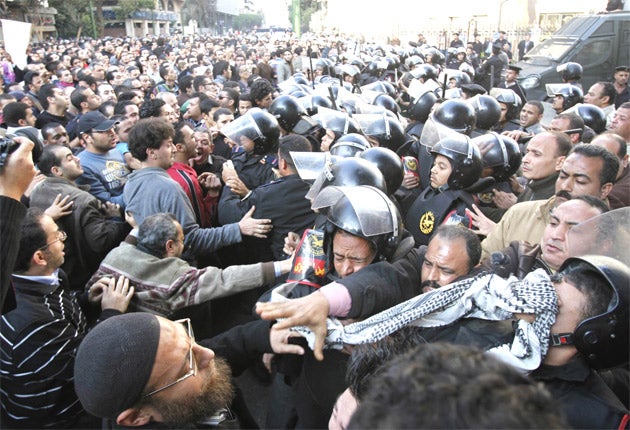Violence on the streets of Cairo as unrest grows
Protesters rise up against Mubarak in cities throughout the nation as spirit of uprising spreads from Tunisia

Your support helps us to tell the story
From reproductive rights to climate change to Big Tech, The Independent is on the ground when the story is developing. Whether it's investigating the financials of Elon Musk's pro-Trump PAC or producing our latest documentary, 'The A Word', which shines a light on the American women fighting for reproductive rights, we know how important it is to parse out the facts from the messaging.
At such a critical moment in US history, we need reporters on the ground. Your donation allows us to keep sending journalists to speak to both sides of the story.
The Independent is trusted by Americans across the entire political spectrum. And unlike many other quality news outlets, we choose not to lock Americans out of our reporting and analysis with paywalls. We believe quality journalism should be available to everyone, paid for by those who can afford it.
Your support makes all the difference.Tens of thousands of people took to the streets of Egypt's cities yesterday, calling for an end to Hosni Mubarak's 29-year presidency in demonstrations which erupted into violent clashes. The protests were inspired by the recent revolt in Tunisia.
Angry crowds in Cairo hurled rocks and bottles and attempted to clamber aboard security vehicles. Police retaliated with water cannon and tear gas in attempts to disperse the crowds.
Chanting "down with Mubarak", and "freedom", marchers railed against corruption, failed economic policies and a police state that is quick to crack down on dissent.
Egyptian officials said last night that a policeman had been killed in the protests, while there were reports of two deaths in the city of Suez.
The unauthorised protests were the largest seen in Egypt in many years, and come as leaders in the Arab world – fearful of a domino effect from the events in Tunisia – try to placate citizens weary of authoritarian rule and deteriorating quality of life.
Thousands of police were widely deployed through Egypt's capital yesterday, corralling off protesters and blocking off routes of entry.
But as the protests gathered in strength, television footage showed demonstrators chasing police down side streets. One protester climbed into a fire engine and drove it away.
The police response appeared restrained at first in a country where security forces are usually quick to crack down on flash protests and are accused of brutality. Security sources were quoted as saying they were under orders not to clash with protesters.
But as huge crowds swarmed into Cairo's central Tahrir Square, the police changed tactics and began beating protesters.
Much of the anger was aimed at the ageing Mr Mubarak, who has ruled Egypt with an iron fist since 1981 and is expected to run for another term in elections in September, despite the many questions surrounding his health. Analysts say that he is grooming his son, Gamal, to succeed him.
Protests broke out in several other Egyptian cities, and it was estimated that some 20,000 people came out onto the streets, many of them shouting "Tunisia, Tunisia".
"We are fed up, this is just enough," Sayid Abdelfatah, a 38-year-old civil servant, told the Associated Press. "Tunisia's revolution inspired me but I really never thought we would find such people ready to do the same here."
As in Tunisia, 90,000 Egyptians signed up to a Facebook group helping to organise the protests, a sign of the vacuum left by more organised opposition groups. The page monitors posted live feeds, advising people on where to meet and how to dodge police.
Social media was instrumental in bringing Tunisia's protests to domestic and global attention after a street vendor in a small town set himself on fire after an altercation with a policewoman. What began as a local event gradually spread to the whole of the country, galvanising citizens into action after years of strict rule that left many poor. The protests finally swept aside President Zine el-Abidine Ben Ali after 23 years in power.
But there was little indication that organisers in Egypt could channel demonstrators' anger into a political challenge capable of toppling the country's authoritarian rulers any time soon.
Many feared a Tunisian-style revolt could sweep the Middle East as protesters took to the streets in Jordan, Egypt, Yemen and elsewhere over deepening economic woes, prompting the head of the Arab League last week to urge regional leaders to heed the gathering discontent. The League's members committed to a $2bn package aimed at alleviating economic difficulties.
Some predicted Egypt might face the most potent resistance, as it shares many of Tunisia's problems, such as high unemployment and food prices.
But unlike in Tunisia, where a relatively prosperous educated middle class spurred change, those in neighbouring countries are poorer, and arguably less politically aware. In Egypt, the army is much more supportive of the regime. But events in Tunisia have emboldened citizens throughout the region.
Join our commenting forum
Join thought-provoking conversations, follow other Independent readers and see their replies
Comments